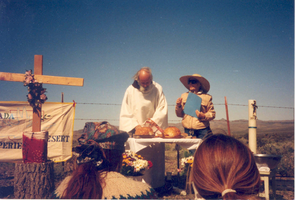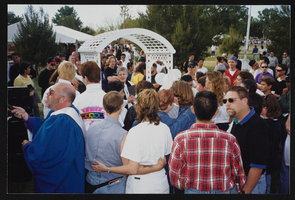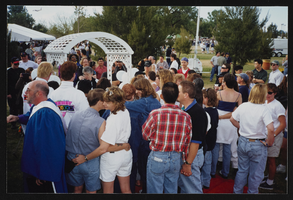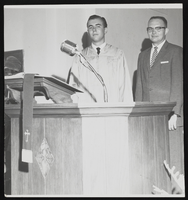Search the Special Collections and Archives Portal
Search Results

Alain Richard and Sister Rosemary Lynch behind an altar: photographic print
Date
Archival Collection
Description
Image
Audio recording clip of interview with Louis Vitale by Mary Palevsky, May 19, 2004
Date
Archival Collection
Description
Sound

Mass holy union ceremony performed at Gay pride, image 001: photographic print
Date
Archival Collection
Description
Image

Mass holy union ceremony performed at Gay pride, image 002: photographic print
Date
Archival Collection
Description
Image
Melvin Green oral history interviews
Identifier
Abstract
Oral history interviews with Melvin Green conducted by Robin Fults on November 28 and December 1, 2014 for the African Americans in Las Vegas: a Collaborative Oral History Project. In this interview, Green talks about growing up in Bonita, Louisiana and his education through college. He then talks about working for an architectural firm in Connecticut before being recruited to join a firm in Las Vegas, Nevada in 1986. He relates numerous stories about his childhood, discusses problems with discrimination and segregation in the South, and an example of discrimination from a Las Vegas furniture store in the late 1980s. He expands on his views of religion, spirituality, and politics, the importance of travel, of hard work, and commitment. He also gives examples of architectural projects that he has created.
Archival Collection

Transcript of interview with Lendon Kaye Barney by Kelly Adams, March 3, 1978
Date
Archival Collection
Description
Text

Jewish Federation correspondence, meeting minutes, and other records, item 02
Description
Memo from Arne Rosencrantz to the Board of Directors for the Jewish Federation of Las Vegas, Nevada.
Stewart, Omer Call, 1908-1991
Omer C. Stewart (1908-1991) was Professor Emeritus of the Department of Anthropology at the University of Colorado in Boulder, Colorado and a renowned scholar of indigenous religions, particularly peyotism. He was also an outspoken advocate for the indigenous nations of the United States. Omer C. Stewart and Martha C. Knack wrote a book together in 1984 titled As Long as the River Shall Run: An Ethnohistory of Pyramid Lake Indian Reservation.
Source:
Person

Photograph of youth worship leaders at church podium, (Nev.), 1940-1960
Date
Archival Collection
Description
Image

